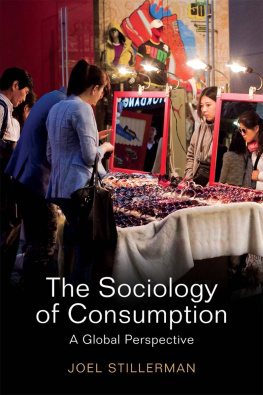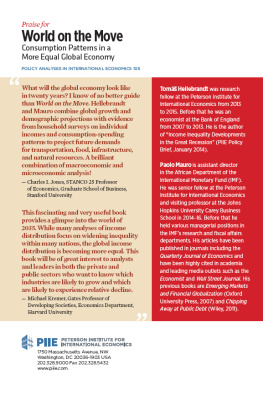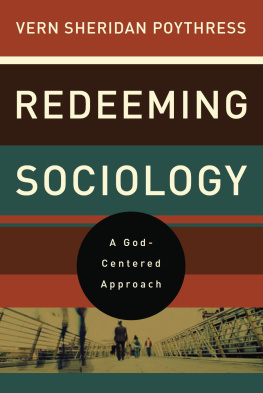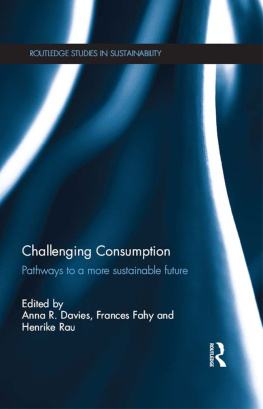Stillerman Joel - The Sociology of Consumption: a Global Approach
Here you can read online Stillerman Joel - The Sociology of Consumption: a Global Approach full text of the book (entire story) in english for free. Download pdf and epub, get meaning, cover and reviews about this ebook. City: Oxford, year: 2015, publisher: Wiley, genre: Politics. Description of the work, (preface) as well as reviews are available. Best literature library LitArk.com created for fans of good reading and offers a wide selection of genres:
Romance novel
Science fiction
Adventure
Detective
Science
History
Home and family
Prose
Art
Politics
Computer
Non-fiction
Religion
Business
Children
Humor
Choose a favorite category and find really read worthwhile books. Enjoy immersion in the world of imagination, feel the emotions of the characters or learn something new for yourself, make an fascinating discovery.
- Book:The Sociology of Consumption: a Global Approach
- Author:
- Publisher:Wiley
- Genre:
- Year:2015
- City:Oxford
- Rating:5 / 5
- Favourites:Add to favourites
- Your mark:
- 100
- 1
- 2
- 3
- 4
- 5
The Sociology of Consumption: a Global Approach: summary, description and annotation
We offer to read an annotation, description, summary or preface (depends on what the author of the book "The Sociology of Consumption: a Global Approach" wrote himself). If you haven't found the necessary information about the book — write in the comments, we will try to find it.
The Sociology of Consumption: a Global Approach — read online for free the complete book (whole text) full work
Below is the text of the book, divided by pages. System saving the place of the last page read, allows you to conveniently read the book "The Sociology of Consumption: a Global Approach" online for free, without having to search again every time where you left off. Put a bookmark, and you can go to the page where you finished reading at any time.
Font size:
Interval:
Bookmark:

Joel Stillerman
polity
Copyright Joel Stillerman 2015
The right of Joel Stillerman to be identified as Author of this Work has been asserted in accordance with the UK Copyright, Designs and Patents Act 1988.
First published in 2015 by Polity Press
Polity Press
65 Bridge Street
Cambridge CB2 1UR, UK
Polity Press
350 Main Street
Malden, MA 02148, USA
All rights reserved. Except for the quotation of short passages for the purpose of criticism and review, no part of this publication may be reproduced, stored in a retrieval system, or transmitted, in any form or by any means, electronic, mechanical, photocopying, recording or otherwise, without the prior permission of the publisher.
ISBN-13: 978-0-7456-9691-1
A catalogue record for this book is available from the British Library.
Library of Congress Cataloging-in-Publication Data
Stillerman, Joel (Sociologist)
The sociology of consumption : a global approach/Joel Stillerman. pages cm
Includes bibliographical references and index.
ISBN 978-0-7456-6127-8 (hardback : alk. paper) ISBN 978-0-7456-6128-5 (pbk. : alk. paper) 1. Consumption (Economics)Social aspects. 2. Consumer behavior. I. Title.
HC79.C6.S755 2015
306.3--dc23
2014038635
The publisher has used its best endeavors to ensure that the URLs for external websites referred to in this book are correct and active at the time of going to press. However, the publisher has no responsibility for the websites and can make no guarantee that a site will remain live or that the content is or will remain appropriate.
Every effort has been made to trace all copyright holders, but if any have been inadvertently overlooked the publisher will be pleased to include any necessary credits in any subsequent reprint or edition.
For further information on Polity, visit our website:
politybooks.com
Several individuals were important to the completion of this book. First, I would like to thank Emma Longstaff at Polity for inviting me to write this book and for her support and guidance as it moved from an initial idea to a manuscript. Jonathan Skerrett, Lauren Mulholland, and Elen Griffiths helped me move the manuscript toward completion. Clare Ansell and Helen Gray provided expert support with copy-editing and production. Toms Ariztia, Omar Lizardo (who identified himself as one of Politys external reviewers), and two anonymous reviewers provided invaluable comments and criticisms that allowed me to make significant improvements on the initial proposal and manuscript. Kristy Marchard, Samantha Schires, and Katherine Parr provided me with extremely helpful research assistance as I developed the manuscript. Prior to writing this book, several journal and book editors published my work on consumption in Chile. I would like to thank Don Slater, George Ritzer, Anthony Orum, Javier Auyero, Alfonso Morales, John Cross, Dan Cook, Gay Seidman, Kent Sandstrom, Anna Pertierra, and John Sinclair for providing me with a venue for my scholarship and helping me to sharpen my thinking on this topic. Finally, my daughters, Micaela and Gabriella, and my wife, Leyla, have been enormously patient and supportive throughout this process. We can all breathe a sigh of relief now that Daddys book is done.
Introduction
Pop singer Beyonc Knowles was the headline act during the Super Bowl 2013 half-time show. This event illustrates several dimensions of contemporary consumption explored in this book. The Super Bowl has the largest audience of any televised program in the United States, fans engage in many rituals while viewing the game, and Super Bowl advertisements set industry trends for the upcoming year. The game tells us something about contemporary American culture, our habits of consuming food and media, and what many of us think is important, since millions of us tune in. It also illustrates group identities and their expression, as fans wear their favorite teams jerseys and build replicas of the football stadium with sandwiches and potato chips. Additionally, men and women have different viewing habits and watch with different levels of attention. Finally, the Super Bowl is one of the few rituals (shared, meaningful activities) in which a large cross-section of Americans participate.
In 2013, advertisers paid approximately $4 million dollars per 30-second spot with the hopes that their humorous or eye-catching ads would secure brand loyalty among the diverse age, gender, income, and ethnic/racial groups that view this event (Konrad 2013). The ads reflect and influence our ideas and behaviors in relation to work, leisure, money, gender, sex, race, and everyday life.
The half-time show often features established performers that commercial sponsors (Pepsi this year) hope will appeal to a broad range of viewers and persuade them to increase their purchases of the sponsors product. This year, Beyonc had a small problem, as she had been caught lip-syncing The Star-Spangled Banner during President Barack Obamas inauguration into his second term just weeks before (Moody 2013). Hence, many journalists, bloggers, and observers believed Beyonc had to give a superb performance in order to rescue her career. Like other half-time shows, Beyoncs performance included a massive light show and highly stylized dancing with female performers sporting sexually provocative clothing.
Apart from the usual ingredients, the Beyonc show made some interesting implicit comments about gender and race. The fact that the band is all female visibly contrasts with womens traditional roles in pop music as singers rather than instrumentalists in a male-dominated profession (Milestone and Meyer 2012). Further, Beyonc is part of a long tradition of music and dance cultivated within the black community. At the same time, being an entertainer is one of the few occupations relegated to African Americans by a dominant white majority (Jones 1963; Dyer 2009).
This event contains many of the ingredients of our complex and dynamic consumer society. Nonetheless, it is only a small piece of the puzzle. This once-a-year, turbo-charged spectacle has little to do with our daily consumption. To study consumption is to address its spectacular forms, like the Super Bowl or purchases of luxury goods, as well as its mundane, everyday forms eating, grocery shopping, buying clothing, and visiting the gas station. Further, the Super Bowl is meaningful primarily for Americans, though it may be viewed in other countries. To what extent does the larger than life, bigger is always better model of consumption symbolized by the Super Bowl reflect the consumer behavior of most Americans, and how is it similar to or different from consumption in other countries?
This book seeks to understand the fast-changing world of consumption the desire for, purchase, use, display, sharing, exchange, and disposal of products and services. Other general works offer valuable insights on this phenomenon, and I will build on their ideas throughout this book (see Slater 1997; Lury 2011; Lee 2000; Schor and Holt 2000; Sassatelli 2007; Smart 2010). However, this book is different from these works in three important ways. This book focuses on global consumption, consumption and inequality, and consumer citizenship.
General discussions focus on consumers in the United States and Europe; but today, some of the most important areas of expansion of consumption are outside the Global North (the U.S. and Europe) in the regions we now call the Global South (Parker 2009). These are non-European societies, many of which were colonized by European powers or financially dependent on the U.S., but whose wealth has expanded in recent decades. The economically most important of these countries are the so-called BRICs (Brazil, Russia, India, and China), though these changes are present in many countries throughout the world. Having studied consumption in the South American country of Chile since the late 1990s, I am acutely aware of how models of consumption exported from the Global North affect countries of the Global South, but also how countries in the Global South have distinct patterns of consumption that reflect their different histories, cultures, and societies. Since Europe and the U.S. only represent a small percentage of the worlds population, an analysis of consumption must take into account patterns in the Global South.
Font size:
Interval:
Bookmark:
Similar books «The Sociology of Consumption: a Global Approach»
Look at similar books to The Sociology of Consumption: a Global Approach. We have selected literature similar in name and meaning in the hope of providing readers with more options to find new, interesting, not yet read works.
Discussion, reviews of the book The Sociology of Consumption: a Global Approach and just readers' own opinions. Leave your comments, write what you think about the work, its meaning or the main characters. Specify what exactly you liked and what you didn't like, and why you think so.











